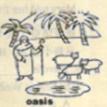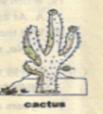A desert is a very dry land where there is hardly any rain. In the day, it can be so hot that you could fry an egg on the ground. But during the night it is sometimes so could that water would turn into ice.






Many desserts are covered in sand. But some have mountains, rocks, or lakes that have dried up in the heat. The Great American Dessert has cliffs(悬崖) that have been made into amazing and beautiful shapes by the wind. The Sahara Desert in Africa is mostly sand. The Australian Desert has red sand.
Sometimes it does not rain for a whole year in the desert. But there is water deep under the ground and some plants have roots that go very deep to find it. Other plants have roots that spread out(延伸) a long way so they can
suck up the rain as soon as it falls.
One desert plant is the cactus, which has long, spreading roots. The cactus stores water inside its hard skin. This skin protects it from heat and cold.
Camels are a bit like cactus plants! They store water too—inside their bodies. They have special fur which protects them from the sun during the day and keeps them warm at night.
Some other animals live in deserts, too. They have to be very good at seeing and hearing because most of them only come out at night. This is why many desert animals have extra big eyes or ears.
A desert fox has bigger ears than a normal for. A gerbil has huge eye, so that it can see at night. It stays cool in the day by staying underground, like most desert animals.
Some people live in the desert but they always make their homes near an oasis. An oasis is where water comes from an underground river. Near an oasis, people can grow lots of plants and keep animals.
Life is hard in the desert, for people, animals and plants. But desert people like to live there.
【小题1】A desert is very dry because__________.
| A.it is sandy | B.there is so little rain |
| C.the wind is strong | D.there is no water deep under the ground |
【小题2】What does the underlined phrase"
suck up"in paragraph 3 mean_________?
【小题3】Some desert animals have extra big eyes or ears because__________.
| A.the sunlight is too strong in the day | B.they need to see and hear well at night |
| C.it is very cold at nigh | D.they store water in them. |
【小题4】Most desert animals stay cool in the day by_________.
| A.storing water in side their bodies | B.drinking water as much as they can |
| C.staying underground | D.growing lots of plants |
【小题5】Which of the following is true?
| A.Desert people like to live in the desert though life is hard. |
| B.People in the desert usually fry eggs on the ground. |
| C.Camels have special fur to store water. |
| D.All the deserts are covered in sand. |







